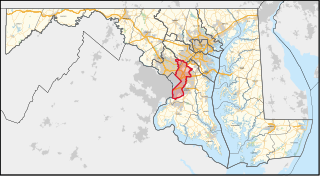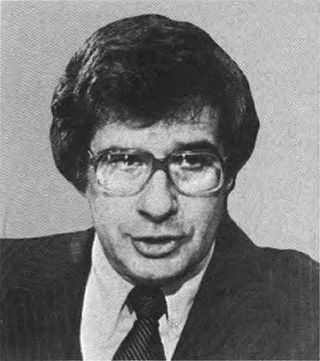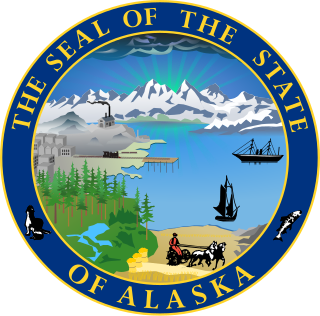Since Alabama became a U.S. state in 1819, it has sent congressional delegations to the United States Senate and United States House of Representatives. Each state elects two senators to serve for six years, and members of the House to two-year terms. Before becoming a state, the Alabama Territory elected a non-voting delegate at-large to Congress from 1818 to 1819.

John Henry Kyl was an American politician who served as a member of the United States House of Representatives, representing Iowa's 4th congressional district from 1959 to 1965 and again from 1967 to 1973. He was a member of the Republican Party.
These are tables of congressional delegations from New York to the United States House of Representatives and the United States Senate.

These are tables of congressional delegations from the State of Texas to the United States Senate and United States House of Representatives.
Since Florida became a U.S. state in 1845, it has sent congressional delegations to the United States Senate and United States House of Representatives. Each state elects two senators to serve for six years, and members of the House to two-year terms. Before becoming a state, the Florida Territory elected a non-voting delegate at-large to Congress from 1822 to 1845.
Since Colorado became a U.S. state in 1876, it has sent congressional delegations to the United States Senate and United States House of Representatives. Each state elects two senators to serve for six years, and members of the House to two-year terms. Before becoming a state, the Colorado Territory elected a non-voting delegate at-large to Congress from 1861 to 1876.
These are tables of congressional delegations from Tennessee to the United States House of Representatives and the United States Senate.
Since Iowa became a U.S. state in 1846, it has sent congressional delegations to the United States Senate and United States House of Representatives. Each state elects two senators to serve for six years, and members of the House to two-year terms. Before becoming a state, the Iowa Territory elected a non-voting delegate at-large to Congress from 1838 to 1846.

North Dakota's at-large congressional district is the sole congressional district for the state of North Dakota. Based on size, it is the eighth largest congressional district in the nation.

The U.S. state of New York contains 26 congressional districts. Each district elects one member of the United States House of Representatives to represent it.

The 1970 United States House of Representatives elections was an election for the United States House of Representatives held on November 3, 1970, to elect members to serve in the 92nd United States Congress. They occurred in the middle of Richard M. Nixon's first term as president. His party, the Republican Party, lost a net of 12 seats to the Democratic Party, which thereby increased its majority in the House. Many viewed the results of the 1970 election as an indication of public fatigue over the ongoing Vietnam War as well as the fallout from the Kent State Massacre.

Maryland's 4th congressional district wraps around the eastern edge of Washington, D.C., taking in most of Prince George's County and a small portion of Montgomery County. It is home to several racially diverse middle-class suburbs, including College Park, Fort Washington, Greenbelt, and Laurel. With a median household income of $86,941, it is the wealthiest black-majority district in the United States.

Virginia's 10th congressional district is a U.S. congressional district in the Commonwealth of Virginia. It is represented by Democrat Jennifer Wexton, who was first elected in 2018.

Robert William Davis was an American politician from the state of Michigan. He represented the state's 11th congressional district, which at that time included the Upper Peninsula and a large portion of Northern Michigan, in the United States House of Representatives from 1979 until 1993.

Ruth Thompson was a Republican politician from the U.S. state of Michigan. A lawyer by profession, she served three terms in the United States House of Representatives from 1951 to 1957.

The United States House of Representatives elections in California, 1970 was an election for California's delegation to the United States House of Representatives, which occurred as part of the general election of the House of Representatives on November 3, 1970. Republicans won one open seat when John V. Tunney retired to run for Senate.

The number of elections in Alaska varies by year, but typically municipal elections occur every year, plus primary and general elections for federal and state offices occur during even-numbered years. Alaska has a gubernatorial election every four years. Members of the state's United States congressional delegation run for election or re-election at the times set out in the United States Constitution. Primary elections assist in choosing political parties' nominees for various positions. On a regional basis, elections also cover municipal issues. In addition, a special election can occur at any time.

The 1970 United States House of Representatives elections in South Carolina were held on November 3, 1970, to select six Representatives for two-year terms from the state of South Carolina. The primary elections were held on June 9 and the runoff elections were held two weeks later on June 23. All five incumbents who ran were re-elected and the open seat in the 2nd district was retained by the Republicans. The composition of the state delegation remained five Democrats and one Republican.

The 1972 United States House of Representatives elections in Texas occurred on November 7, 1972, to elect the members of the state of Texas's delegation to the United States House of Representatives. Texas had twenty-four seats in the House, up one from the 1960s, apportioned according to the 1970 United States census.














